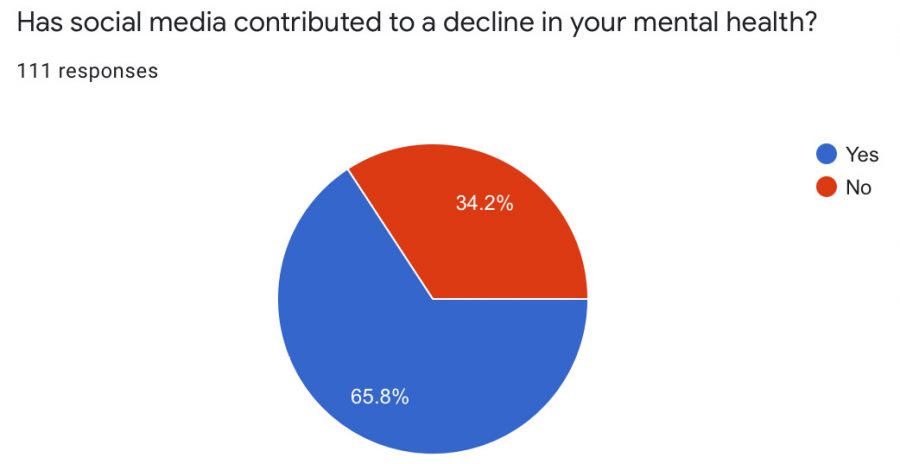Are people truly happy?
May 17, 2021
Are people truly happy? It’s a question that has crossed my mind many times over the past year. Even before the world went through the Covid-19 pandemic, it was something I pondered, just not as much.
Happiness is such an interesting, yet complex concept. There is no one universal way to describe happiness because it is different for everyone. Everyone finds happiness in different things in life, which is what makes it so amazing, it’s personalized. Yet it seems that nowadays more people are unhappy, and that begs the question why? We are living in the most technologically advanced time in history. Everything we could want or need are at our fingertips, and maybe that’s the problem. We are living in an era, where mental health disorders are on the incline. An era where people constantly compare themselves to their friends or peers because of social media. An era of unhappiness.
According to Mental Health America, the prevalence of mental health illness among adults was increasing. In 2017-2018, 19% of adults experienced a mental illness, an increase of 1.5 million people over the previous years data set.
“Me and my friends have had a hard year,” said a Norwin anonymous freshman girl in a recent poll. “Especially starting high school during a pandemic, it’s been a difficult adjustment, and our mental health has definitely been a bit of an issue.”
It’s no secret that mental health has been an increasing issue for a lot of people, and that’s something that can affect one’s happiness, but it still begs the question why? Why are people unhappy? Maybe it has to do with the fact that we live in an era where comparing yourself with others is as easy as the push of a button: Social media.
“I have a love hate relationship with social media,” said an anonymous sophomore girl. “I really enjoy using it and posting on it, but I also find myself obsessing over posting the best picture, or really noticing how I look compared to others. It can make me feel bad about myself, but it also makes me feel good about myself.”
Social media definitely has its benefits, if it didn’t people would have stopped using it by now. According to The Washington Post, social media strengthens friendships, offers a sense of belonging, provides support, and lets people express themselves.
Although in today’s society, social media is a big contributing factor to people’s unhappiness and declining mental health.
“This past year has been hard on me,” said an anonymous junior boy. “My parents have been very strict about COVID, so watching all my friends hanging out without me on Snap stories really took a toll on me. I felt left out.”
Research suggests that people who limit their time on social media tend to be happier than those who don’t. Studies also indicate that social media may trigger an array of negative emotions in users that contribute to or worsen their depression symptoms. A 2018 University of Pennsylvania study, found that the less time people spend on social media, the less symptoms of depression and loneliness they felt.
“ I have struggled with mental health in the past and I realized it was because I put too much pressure on myself to appear perfect in all aspects of my life, especially on my social media,” said an anonymous Norwin senior. “I would be the person who took 200 pictures just to find the perfect one to post and then spend hours editing it to make sure it was perfect, and even then after looking at the picture for too long I decided against posting it. Eventually I hit a wall of not loving myself, treating my body poorly because I didn’t like the way it looked, even doing things I’m not proud of because of those intruding thoughts. I needed to reevaluate, and realized that social media was part of the problem. I took a break from posting, stopped going on it and comparing myself to others, and really had to focus on loving myself again. It wasn’t easy. It took me a long time to find confidence within myself again, and I’m still working on it but I’ve come such a long way.”
A study conducted by the Florida House Experience, a healthcare institution, uncovered that both women and men compare their bodies with those in the media. The survey included 1,000 men and women and focused on their body image, confidence, and the media. It found that 87% of women and 65% of men compare their bodies to images they consume on social and traditional media. In that comparison, a stunning 50% of women and 37% of men compare their bodies unfavorably.
“Over the past year I have spent a lot of time working to better myself,” said the anonymous senior. “I find it funny that I am much more critical of myself now than ever before, and I think it’s because I’m so aware of my body compared to everyone else’s that I see on social media. It’s a constant battle to not let myself slip back to those dark thoughts, but a battle I’m willing to fight because I don’t want to spend the rest of my life feeling the way I was a year ago.”
According to Insider, social media can negatively affect body image because users are typically exposed to thin, fit, and “idealized” body types and will often compare themselves to peers and celebrities. Research has found that the more time you spend on social media, the more likely you are to feel worse about yourself and your body.
“People end up creating unrealistic ideals for themselves based on what they see and feel distressed when they aren’t able to meet those ideas or self-expectations,” says Neha Chaudhary, MD, a child and adolescent psychiatrist at Massachusetts General Hospital and Harvard Medical School.
Happiness, something so complex and individualized for each person, has been determined for so many by social media. I’m not saying it is the only factor that plays into happiness, because it’s not, but it sure does affect a lot of people in today’s society. We are living in an era where everything we could want to know is at our fingertips, yet all it’s doing is hurting millions’ happiness.



